#azure devops interview questions
Explore tagged Tumblr posts
Text
Azure DevOps interview questions typically focus on various aspects of the platform, including version control, CI/CD pipelines, agile methodologies, project management, and collaboration tools. Candidates may be asked about their experience with Azure Repos, Azure Pipelines, Test Plans, and integrating DevOps practices to enhance software development and delivery processes. Click here to learn more.
0 notes
Text
#🌟 Preparing for an Azure DevOps interview? Here are the top 5 questions you should know:#1️⃣ What is Azure DevOps?#2️⃣ Describe some Azure DevOps tools. 3️⃣ What is Azure Repos?#4️⃣ What are Azure Pipelines?#5️⃣ Why should I use Azure pipelines and CI/CD?#Get ready to impress your interview techquestions#kloudcourseacademy#AzureDevOps#InterviewPrep#TechQuestions
1 note
·
View note
Text
AI/ML Training in Indore – Future-Proof Your Tech Career with Infograins TCS
Introduction – Master AI & Machine Learning with Industry Experts
In the fast-evolving digital era, Artificial Intelligence (AI) and Machine Learning (ML) are revolutionizing the tech world. Whether you're an aspiring data scientist or a developer looking to pivot, enrolling in AI/ML Training in Indore can give you a competitive edge. Infograins TCS offers a practical, project-based learning environment to help you gain expertise in AI and ML, and prepare for high-demand job roles in top companies.

Overview – Deep Learning to Data Science, All in One Course
Our AI/ML Training in Indore covers the full spectrum of artificial intelligence and machine learning — from Python programming and data handling to deep learning, neural networks, natural language processing (NLP), and model deployment. The training is designed to be hands-on, incorporating real-time projects that mimic real-world business problems. This ensures every learner gains practical exposure and problem-solving skills needed for today’s data-driven ecosystem.
Key Benefits – Why Our AI/ML Training Is the Right Choice
Infograins TCS offers more than just theoretical knowledge. With our training, you will:
Gain hands-on experience with real-world AI/ML projects
Learn from industry experts with years of domain experience
Work with essential tools like TensorFlow, Scikit-learn, and Python
Receive job support and opportunities for ai ml training in Indore as well as internship options
This comprehensive approach ensures you're ready for both entry-level and advanced roles in data science, AI engineering, and analytics.
Why Choose Us – Elevate Your Career with Infograins TCS
Infograins TCS stands out as a trusted AI/ML Training Institute in Indore because of our consistent focus on quality, practical learning, and placement outcomes. With personalized mentoring, updated course content, and real-time learning environments, we ensure every student gets the tools and confidence to succeed in this competitive field. Our goal isn’t just to train you—it’s to launch your career.
Certification Programs at Infograins TCS
After completing the course, students receive a professional certificate that validates their expertise in AI and Machine Learning. Our aiml certification in Indore is recognized by employers and gives you the credibility to showcase your skills on your resume and LinkedIn profile. The certification acts as a career gateway into roles such as Machine Learning Engineer, AI Developer, and Data Scientist.
After Certification – What Opportunities Await You?
Post-certification, we support your journey with job assistance, resume workshops, and interview preparation. We also provide internship opportunities to bridge the gap between theory and application. This helps you gain industry exposure, build a real-world portfolio, and network with professionals in the AI/ML community—boosting your career from learning to landing.
Explore Our More Courses – Broaden Your Tech Skillset
In addition to AI/ML Training in Indore, Infograins TCS offers a range of other career-boosting IT courses:
Data Science with Python
Full Stack Development
Cloud Computing (AWS & Azure)
DevOps and Kubernetes
Business Analyst Training Each program is designed with market demand in mind, ensuring you're equipped with in-demand skills.
Why We as a Helping Partner – Beyond Just Training
Infograins TCS is not just an institute; we are your long-term learning partner. We understand that AI and ML are complex domains and require continued support, practical application, and mentoring. We go beyond traditional classroom training to offer one-on-one mentorship, job-matching guidance, and career tracking. Our AI/ML Training in Indore is designed to give learners lasting success—not just a certificate.
FAQs – Professional Answers to Your Common Questions
1. Who is eligible for the AI/ML training course? This course is open to graduates, working professionals, and anyone with a basic understanding of programming and mathematics.
2. Will I receive a certificate after completing the course? Yes, we offer a professional aiml certification in Indore recognized by industry leaders and tech recruiters.
3. What tools and technologies will I learn? You’ll work with Python, Scikit-learn, TensorFlow, Pandas, NumPy, and more, as part of our hands-on learning methodology.
4. Are there internship opportunities available after the course? Yes, eligible students will be offered internships that involve real-world AI/ML projects to enhance their practical knowledge and resume.
5. Do you offer placement assistance? Absolutely. Our dedicated career support team provides job readiness training, mock interviews, and connects you with top recruiters in the tech industry.
Start Your Journey with AI/ML Training in Indore
The future of technology is intelligent—and you can be at the forefront of it. Join AI/ML Training in Indore at Infograins TCS and turn your ambition into a thriving tech career. Enroll now and take the first step toward becoming an AI & ML professional.
0 notes
Text
Where to learn cloud computing for free ?
💡 Where to Learn Cloud Computing for Free? Your First Steps in 2025

So you’ve heard about cloud computing. Maybe you’ve seen the job titles—Cloud Engineer, DevOps Specialist, AWS Associate—or heard stories of people getting hired after just a few months of learning.
Naturally, you wonder: "Can I learn cloud computing for free?"
Yes, you can. But you need to know where to look, and what free learning can (and can’t) do for your career.
☁️ What Can You Learn for Free?
Free cloud resources help you understand:
What cloud computing is
How AWS, Azure, or GCP platforms work
Basic terminology: IaaS, SaaS, EC2, S3, VPC, IAM
Free-tier services (you can try cloud tools without being charged)
Entry-level certification concepts
🌐 Best Places to Learn Cloud for Free (Legit Sources)
✅ AWS Free Training & AWS Skill Builder
📍 https://aws.amazon.com/training
Learn cloud basics with self-paced videos
Good for AWS Cloud Practitioner prep
Access real AWS Console via the free tier
✅ Microsoft Learn – Azure
📍 https://learn.microsoft.com/en-us/training
Offers free Azure paths for beginners
Gamified learning experience
Ideal for preparing for AZ-900
✅ Google Cloud Skills Boost
📍 https://cloud.google.com/training
Interactive quests and labs
Learn Compute Engine, IAM, BigQuery
Some credits may be needed for advanced labs
✅ YouTube Channels
FreeCodeCamp: Full cloud crash courses
Simplilearn, Edureka, NareshIT: Basic tutorials
AWS, Azure official channels: Real demos
✅ GitHub Repos & Blogs
Open-source lab guides
Resume projects (e.g., deploy a website on AWS)
Real-world practice material
⚠️ But Wait—Here’s What Free Learning Misses
While free content is great to start, most learners eventually hit a wall:
❌ No structured syllabus
❌ No mentor to answer questions
❌ No feedback on real projects
❌ No resume guidance or placement support
❌ Certification confusion (what to take, when, why?)
That’s where formal, hands-on training can make the difference—especially if you want to get hired.
🎓 Want to Learn Faster, Smarter? Try NareshIT’s Cloud Courses
At NareshIT, we’ve helped over 100,000 learners start their cloud journey—with or without a tech background.
We bridge the gap between free concepts and job-ready skills.
🔹 AWS Cloud Beginner Program
Duration: 60 Days
Covers EC2, IAM, S3, Lambda
Includes: AWS Cloud Practitioner & Associate exam prep
Ideal For: Freshers, support engineers, and non-coders
🔹 Azure Fundamentals Course
Duration: 45 Days
Learn VMs, Azure AD, Blob Storage, and DevOps basics
Prepares you for AZ-900 and AZ-104 certifications
Best For: IT admins and .NET developers
🔹 Google Cloud (GCP) Basics
Duration: 30 Days
Practice labs + GCP Associate Cloud Engineer training
Perfect for: Python devs, data learners, AI enthusiasts
📅 View all cloud training batches at NareshIT
👣 Final Words: Start Free. Scale Smart.
If you’re serious about cloud, there’s no shame in starting with free videos or cloud tutorials. That’s how many great engineers begin.
But when you’re ready to:
Work on real projects
Earn certifications
Prepare for interviews
Get career guidance
Then it’s time to consider a guided course like the ones at NareshIT.
📌 Explore new batches →
0 notes
Text
What Is TOSCA Training and Placement, and How Can It Help Your Career?
In today's fast-paced software development landscape, automation testing has become a vital component of quality assurance. As companies shift towards Agile and DevOps methodologies, the need for robust and reliable test automation tools is rising. One tool that stands out in this competitive space is the TOSCA Automation Tool by Tricentis. If you're looking to build a rewarding career in test automation, then TOSCA Training and Placement might be your perfect starting point.
Whether you're a recent graduate or a professional aiming to switch careers, understanding what TOSCA is, how it works, and the benefits of TOSCA training online will give you a significant edge. This blog explores TOSCA Automation Tool for Beginners, explains the career benefits, and provides practical insights into why training and placement in this tool is a smart move.
youtube
What Is TOSCA?
TOSCA stands for Topology and Orchestration Specification for Cloud Applications, but in the context of software testing, it refers to Tricentis TOSCA, a model-based test automation tool.
Key Features of TOSCA
Model-Based Test Automation: No need to write scripts; testers can create automated test cases using drag-and-drop modules.
Risk-Based Testing: Focuses on critical test cases first to reduce testing time and effort.
Integration with CI/CD: Supports integration with Jenkins, Azure DevOps, and other CI/CD tools.
Cross-Platform Testing: Supports desktop, web, mobile, API, and even SAP testing.
Reusable Test Cases: Modular design allows for reusability and efficient test management.
Why Is TOSCA in Demand?
According to a 2024 World Quality Report, 85% of organizations have adopted test automation.
TOSCA is used by top companies like Accenture, Capgemini, and Cognizant.
It simplifies test automation, making it accessible even for non-programmers.
What Does TOSCA Training and Placement Include?
TOSCA Training Online: What You’ll Learn
1. Introduction to Test Automation
What is automation testing?
Advantages of automation over manual testing
2. TOSCA Basics
Installation and setup
TOSCA workspace overview
Types of testing supported
3. Module and Test Case Creation
Working with test cases
Creating reusable modules
Parameterization and data-driven testing
4. Test Case Execution
Execution lists and test configurations
Analyzing execution logs
Reporting and documentation
5. API Testing in TOSCA
Creating API test cases
Validating responses
Integration with web services
6. Advanced Concepts
Risk-based testing implementation
CI/CD pipeline integration
Automating SAP applications
7. Hands-On Projects
Real-world testing scenarios
Simulated industry projects for practice
Placement Support
1. Resume Preparation
Optimizing your resume for automation roles
Highlighting TOSCA skills
2. Interview Guidance
Mock interviews
Commonly asked TOSCA interview questions
3. Job Referrals and Networking
Access to partner companies
LinkedIn and job portal strategies
4. Certification Preparation
TOSCA AS1 (Automation Specialist Level 1)
Guidance to crack Tricentis certifications
Real-World Applications of TOSCA
TOSCA in Banking and Finance
Automating customer onboarding workflows
API testing for banking applications
TOSCA in Healthcare
Validating electronic health record (EHR) systems
Ensuring regulatory compliance
TOSCA in Retail
Cross-browser testing of e-commerce platforms
Mobile application testing for POS systems
TOSCA in Telecom
System integration testing for telecom billing
Regression testing during software upgrades
Who Should Enroll in TOSCA Training and Placement?
Fresh Graduates looking to enter the IT sector
Manual Testers wanting to transition into automation
Developers interested in automation as a secondary skill
Non-IT Professionals seeking a career switch into tech
Benefits of TOSCA Training Online
Flexibility and Convenience
Learn from anywhere at your own pace
Access to recorded sessions and study materials
Instructor-Led Classes
Live doubt-clearing sessions
Real-time interaction with experienced trainers
Cost-Effective Learning
Lower than traditional classroom training
No commuting expenses
Lifetime Access to LMS
Access to videos, notes, and assignments
Revisit concepts anytime during your career
How to Get Started with TOSCA Automation Tool for Beginners
Step-by-Step Beginner’s Guide
Step 1: Understand the Basics
Start by learning what test automation is and how TOSCA fits into the software testing ecosystem.
Step 2: Install TOSCA
Download the trial version from the Tricentis website and install it on your system.
Step 3: Explore the Interface
Familiarize yourself with the TOSCA Commander workspace, test case sections, and module structure.
Step 4: Create Your First Test Case
Use the standard modules to automate a simple web login scenario.
Step 5: Run and Debug
Execute your test case, review logs, and troubleshoot any errors.
Step 6: Advance Gradually
Move on to API testing, data-driven tests, and CI/CD integration.
Why Choose a Professional Training Provider?
Structured Curriculum
A well-designed course ensures you cover all essential topics.
Access to Experts
Industry-experienced instructors guide you with practical knowledge.
Placement Assistance
You get support for resume building, interview preparation, and job placements.
Community Access
Interact with fellow learners and mentors through forums and discussion boards.
Industry Insights: Job Market and Salary Trends
According to Indeed, TOSCA testers in the U.S. earn an average of $95,000 annually.
There are over 5,000 job openings for TOSCA-skilled professionals in the U.S. job market.
The demand for TOSCA is expected to grow 30% annually as more companies automate their testing pipelines.
Common Job Roles After TOSCA Training
TOSCA Automation Engineer
QA Automation Tester
Test Analyst
TOSCA Consultant
Quality Engineer
Tools and Technologies You’ll Work With
Jenkins
Jira
Selenium (integration)
Azure DevOps
Git
SAP Testing Modules
Success Stories: Career Transformations
Case Study 1: From Manual Tester to Automation Lead
Priya, a manual tester from New Jersey, took online TOSCA training and landed an Automation Lead role within 6 months.
Case Study 2: Career Switch from BPO to IT
Rakesh, who worked in BPO, switched to a QA Automation career after completing TOSCA training and is now placed at a Fortune 500 company.
Key Takeaways
TOSCA Training and Placement offers a clear path to high-paying automation roles.
TOSCA is user-friendly and suitable even for non-programmers.
Online training provides flexibility, affordability, and practical experience.
Real-world applications make TOSCA a valuable skill in multiple industries.
Placement support ensures a smooth transition into the job market.
Conclusion
In the competitive tech industry, gaining hands-on experience in tools like TOSCA can set you apart. Whether you're just starting or looking to advance your career, investing in TOSCA Training and Placement is a strategic move. With user-friendly features, strong demand, and real-world relevance, the TOSCA Automation Tool for Beginners opens the door to numerous job opportunities. Choose TOSCA Training Online and take the next big step in your QA career.
Ready to launch your career in automation testing? Enroll in TOSCA Training Online today and transform your future!
0 notes
Text
How to Hire a DevOps Engineer: A Comprehensive Guide for Modern Businesses
In today’s fast-paced tech-driven world, hiring a skilled DevOps engineer is no longer optional—it’s essential. These professionals are the backbone of seamless software delivery, ensuring that development and operations work in harmony. If you're looking to hire a DevOps engineer, this guide will help you navigate the process and find the right talent for your team. And if you want to skip the hassle, OWOW is here to help you hire world-class engineers with ease.
What Does a DevOps Engineer Do?
A DevOps engineer is responsible for bridging the gap between software development and IT operations. They ensure efficient workflows, automate processes, and maintain a robust infrastructure for smooth application deployment. Key responsibilities include:
Implementing CI/CD pipelines.
Managing cloud infrastructure and ensuring scalability.
Enhancing security through DevOps best practices.
Monitoring and troubleshooting system performance.
Why Hiring the Right DevOps Engineer Matters
The right DevOps engineer can:
Streamline Operations: Eliminate bottlenecks in software delivery.
Reduce Downtime: Ensure high availability and quick recovery from failures.
Boost Productivity: Automate repetitive tasks, allowing teams to focus on innovation.
Ensure Security: Implement security measures within the DevOps lifecycle.
Steps to Hire a DevOps Engineer
Define Your Requirements
What platforms do you use? (AWS, Azure, Kubernetes, etc.)
What tools should they master? (Jenkins, Docker, Terraform, etc.)
Do you need specialized expertise, such as cloud-native development or cybersecurity?
Write a Compelling Job Description Highlight essential skills like scripting (Python, Bash), cloud management, and familiarity with DevOps tools. Be transparent about your expectations and company culture.
Leverage OWOW for Hiring Save time and resources by partnering with OWOW. We connect you with pre-vetted, highly skilled DevOps engineers who are ready to join your team. Explore OWOW’s platform to hire top talent from across the globe.
Conduct Rigorous Interviews Test their technical skills, problem-solving ability, and cultural fit. Questions could include:
How would you set up a CI/CD pipeline from scratch?
How do you monitor application performance in a cloud environment?
Onboard and Support Provide a clear onboarding process and access to the tools they’ll need. Foster a collaborative environment to help them succeed.
Where to Find the Best DevOps Engineers
Finding skilled DevOps engineers can be challenging. Traditional hiring methods may not yield the results you need. That’s where OWOW comes in. With a global talent pool and rigorous vetting processes, we make hiring DevOps engineers simple and effective.
Visit OWOW Talents to get started today.
Conclusion
Hiring a DevOps engineer is an investment in the future of your business. With the right approach and resources, you can find the perfect fit for your team. For a hassle-free hiring experience, trust OWOW to connect you with the best DevOps engineers from around the world.
Start building your dream DevOps team today—Explore OWOW!
0 notes
Text
Breaking into Tech: What Freshers Need to Know About Entry-Level Jobs in 2025"
Navigating the tech job market as a fresher in 2025 requires an understanding of industry trends, emerging skills, and effective strategies for job applications. The technology landscape is rapidly evolving, with trends such as remote work, automation, and cloud computing shaping the demand for tech professionals. Freshers need to equip themselves with the right skills and strategies to secure lucrative entry-level positions in this dynamic environment.
Key Trends in the Tech Job Market
Remote Work is Here to Stay The trend of remote work, which accelerated during the COVID-19 pandemic, has become a standard in many tech roles. Companies have recognized the benefits of flexible work environments, and remote positions are becoming more common. For freshers, this means that geographical limitations are less of a barrier when applying for jobs, expanding the range of potential employers.
Rising Demand for Cloud Computing Skills The shift to cloud-based infrastructure continues to grow, with companies investing in cloud computing to drive scalability and efficiency. This has led to an increased demand for cloud engineers, DevOps professionals, and cloud administrators. Freshers with certifications in cloud platforms such as AWS, Microsoft Azure, or Google Cloud will have a competitive edge.
Automation and AI Integration Automation and artificial intelligence (AI) are transforming various industries, leading to the automation of repetitive tasks and the creation of new roles focused on AI and machine learning. Entry-level positions such as data analyst, AI engineer, or machine learning developer are becoming more popular as companies seek talent to help implement and maintain AI solutions.
Preparing for Interviews and Tailoring Resumes
Freshers need to present themselves effectively to stand out in a competitive job market. Here’s how:
Tailor Resumes for Each Application Customize your resume for each job application by emphasizing relevant skills, certifications, and projects that align with the job description. Use keywords from the job posting to optimize your resume for applicant tracking systems (ATS).
Practice Technical Interview Skills Technical interviews often include coding challenges, algorithm problems, and technical questions. Freshers should practice solving problems on platforms like LeetCode, HackerRank, or CodeSignal. Familiarity with data structures, algorithms, and coding languages relevant to the job is crucial.
Showcase Projects and Hands-On Experience Building a portfolio that includes personal projects, coursework, or freelance work can help demonstrate practical skills. Projects that involve solving real-world problems or using trending technologies, such as cloud computing, AI, or full-stack development, will make your profile more appealing.
Watch our YouTube video for a detailed guide on the highest-paying entry-level positions in 2025 and how to position yourself to get hired.
0 notes
Text
Navigating Your Path to Becoming a DevOps Engineer
Are you aiming to kickstart your career journey as a DevOps engineer? DevOps stands at the intersection of software development and IT operations, offering a blend of practices that streamline and automate processes. With organizations prioritizing efficient software delivery, the demand for adept DevOps professionals continues to surge. If you're eager to carve your niche in this dynamic field, here's a comprehensive roadmap to help you land your dream DevOps engineer role.
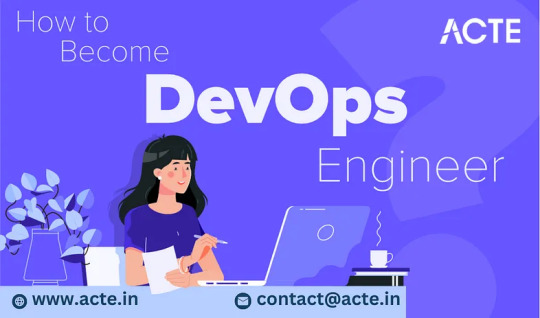
Step 1: Grasp the Core Concepts
Before delving into job applications, it's essential to grasp the core tenets of DevOps. This entails understanding the principles behind continuous integration, continuous delivery, automated testing, and infrastructure as code.
Familiarize yourself with key DevOps tools like Docker, Kubernetes, Jenkins, Ansible, and Git. Leverage online tutorials, courses, and resources to deepen your understanding of these concepts and tools.
Step 2: Refine Your Skill Set
With the fundamentals in place, it's time to hone your skills through practical application. Set up a lab environment on your machine or utilize cloud platforms like AWS, Azure, or Google Cloud to gain hands-on experience in deploying and managing infrastructure.
Engage in projects that involve automating tasks, configuring CI/CD pipelines, and working with containerized applications. Consider pursuing relevant certifications such as AWS Certified DevOps Engineer, Docker Certified Associate, and Certified Kubernetes Administrator to validate your expertise.
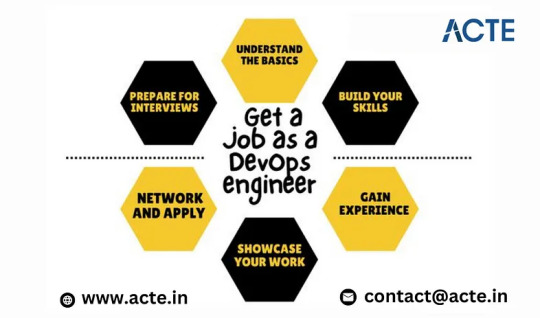
Step 3: Gain Practical Experience
Hands-on experience is invaluable in the journey to becoming a proficient DevOps engineer. Seek out opportunities for real-world exposure, whether through internships, freelance projects, or contributions to open-source initiatives.
Immerse yourself in online communities and forums to collaborate with peers, share insights, and stay abreast of industry trends. If you're currently employed in a different IT or software development role, look for opportunities to incorporate DevOps-related tasks into your responsibilities.
Step 4: Showcase Your Accomplishments
As you accumulate experience and refine your skills, build a compelling portfolio to showcase your achievements. This could take the form of a personal website, a GitHub repository, or a polished LinkedIn profile.
Highlight the projects you've worked on, the technologies you've utilized, and the outcomes you've achieved. Tailor your resume and cover letter to emphasize your DevOps expertise, using specific examples to demonstrate your contributions to successful projects.
Step 5: Network Strategically
Networking plays a crucial role in advancing your DevOps career. Attend industry events, meetups, and conferences to connect with professionals in the field. Engage in online communities and forums to expand your network and stay informed about job opportunities.
When applying for DevOps engineer roles, customize your applications to align with each company's culture and requirements. Demonstrate how your skills and experience can contribute to their objectives and success.
Step 6: Prepare for Interviews
Prepare thoroughly for interviews by familiarizing yourself with common DevOps interview questions and scenarios. Be ready to discuss your experience with relevant tools and technologies, as well as your problem-solving abilities and collaborative approach.
During the interview, convey your passion for DevOps and your ability to thrive in a fast-paced, collaborative environment. Highlight your communication skills, adaptability, and commitment to continuous learning and growth.
By following this roadmap and remaining dedicated to your professional development, you can increase your chances of securing a fulfilling DevOps engineer role. Good luck on your journey!
0 notes
Text
Unlocking the Path to Success: How to Get Hired as a DevOps Engineer as a Fresher
Entering the competitive field of DevOps as a fresher can be both challenging and exciting. With the increasing demand for skilled DevOps engineers, there are ample opportunities for those who are well-prepared and dedicated. In this blog post, we'll explore the key steps to help you secure a DevOps engineer position right out of college.
Understand the Basics of DevOps: Before diving into the job market, it's crucial to have a solid understanding of what DevOps is. DevOps is not just a set of tools but a culture that emphasizes collaboration, communication, and integration between software development and IT operations. Familiarize yourself with core DevOps principles, methodologies, and practices.
Acquire Relevant Skills: DevOps is a multidisciplinary field that requires a combination of skills from development and operations. As a fresher, focus on acquiring the following skills:
Version control (e.g., Git)
Continuous Integration/Continuous Deployment (CI/CD) tools (e.g., Jenkins)
Containerization tools (e.g., Docker)
Infrastructure as Code (IaC) (e.g., Terraform)
Scripting languages (e.g., Python, Bash)
Configuration Management tools (e.g., Ansible, Puppet)
Build a Strong Foundation in Cloud Technologies: DevOps and cloud technologies go hand in hand. Familiarize yourself with popular cloud platforms such as AWS, Azure, or Google Cloud. Many organizations are adopting cloud services for scalability, flexibility, and cost-efficiency, so having cloud expertise is a significant advantage.
Create a Compelling Portfolio: Develop a portfolio showcasing your projects, achievements, and the skills you've acquired. Include any relevant internships, personal projects, or contributions to open-source projects. This will serve as tangible evidence of your capabilities and passion for DevOps.
Networking and Online Presence: Attend meetups, webinars, and conferences related to DevOps. Connect with professionals in the industry on platforms like LinkedIn and GitHub. Engage in discussions, share your projects, and seek guidance. Building a strong online presence can catch the attention of recruiters and hiring managers.
Certifications: Consider pursuing relevant certifications to validate your skills. Certifications from recognized bodies, such as AWS Certified DevOps Engineer, Docker Certified Associate, or Microsoft Certified: Azure DevOps Engineer Expert, can enhance your credibility.
Tailor Your Resume: Customize your resume to highlight your DevOps skills, projects, and any relevant experience. Use action verbs to describe your achievements and responsibilities. Emphasize your ability to work collaboratively, problem-solving skills, and commitment to continuous improvement.
Prepare for Technical Interviews: Be ready to demonstrate your technical skills in interviews. Practice common DevOps interview questions, problem-solving exercises, and be able to articulate your thought process. Showcase your ability to troubleshoot, automate processes, and optimize workflows.
Showcase Soft Skills: DevOps is not just about technical skills; soft skills are equally important. Highlight your communication skills, adaptability, teamwork, and problem-solving abilities. Employers are looking for candidates who can thrive in a collaborative and fast-paced environment.
Stay Updated and Keep Learning: The world of DevOps is dynamic, with new tools and practices emerging regularly. Stay informed about industry trends, attend workshops, and continuously expand your skill set to stay competitive in the job market.
Conclusion:
Securing a DevOps engineer position as a fresher requires a combination of technical skills, continuous learning, networking, and a strong online presence. By following the steps outlined above and staying dedicated to your professional development, you'll be well on your way to unlocking the path to success in the dynamic world of DevOps. Good luck!
Getting a job as a DevOps engineer as a fresher can seem like a daunting task, but with the right approach and preparation, it is definitely achievable. In this answer, I will provide some valuable tips and insights on how you can increase your chances of landing a job in the exciting field of DevOps.Equip your team with the skills to automate, integrate, and innovate – that's the essence of DevOps training in Hyderabad
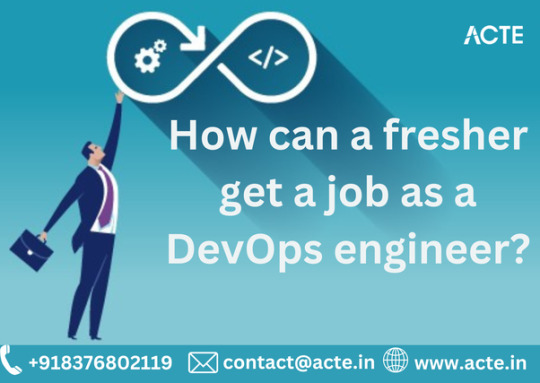
Gain the necessary technical skills: As a fresher, it's important to have a solid foundation in the technical skills required for a DevOps engineer. These skills typically include knowledge of scripting languages like Python or Bash, experience with tools like Git and Jenkins, and an understanding of cloud computing platforms such as AWS or Azure. Invest time in learning these technologies through online courses, tutorials, or even pursuing a relevant certification.
Build a strong foundation in software development: DevOps engineers are responsible for bridging the gap between development and operations. Having a good understanding of software development practices and methodologies will greatly enhance your ability to perform this role effectively. Familiarize yourself with Agile methodologies, version control systems, and software development lifecycle processes.
Gain practical experience through internships and projects: While theoretical knowledge is essential, practical experience is equally important. Look for internships or entry-level positions that can give you hands-on experience in DevOps-related tasks. If you don't have any opportunities available, consider working on personal projects or contributing to open-source projects. This will not only demonstrate your skills but also showcase your passion and dedication to potential employers."No commute, no hassle – just pure DevOps learning. Enrol in our Devops online course and redefine your understanding of seamless software development."
Networking is key: Building relationships with professionals already working in the DevOps field can be invaluable. Attend tech conferences, meetups, and workshops where you can meet industry experts and like-minded individuals. Join online communities and forums where you can engage in discussions and gain insights from experienced professionals. Networking can open doors to job opportunities that might not be advertised publicly.
Customize your resume and cover letter: Tailor your resume and cover letter to highlight your relevant skills, projects, and experiences. Emphasize your knowledge of DevOps tools, your ability to work in cross-functional teams and any experience you have with automation and continuous integration/continuous deployment (CI/CD) pipelines. Be sure to quantify your achievements wherever possible.
Prepare for interviews: Research commonly asked interview questions for DevOps engineer roles and prepare concise yet detailed responses. Be prepared to discuss your understanding of DevOps principles, your experience with various tools and technologies, and how you've contributed to previous projects or teams. Brush up on your problem-solving skills and be ready to demonstrate your ability to troubleshoot and solve technical challenges.
Continuous learning: The field of DevOps is constantly evolving, so it's important to stay up-to-date with the latest trends and technologies. Subscribe to industry blogs, follow thought leaders on social media platforms, and join online communities where you can continue learning from others in the field.
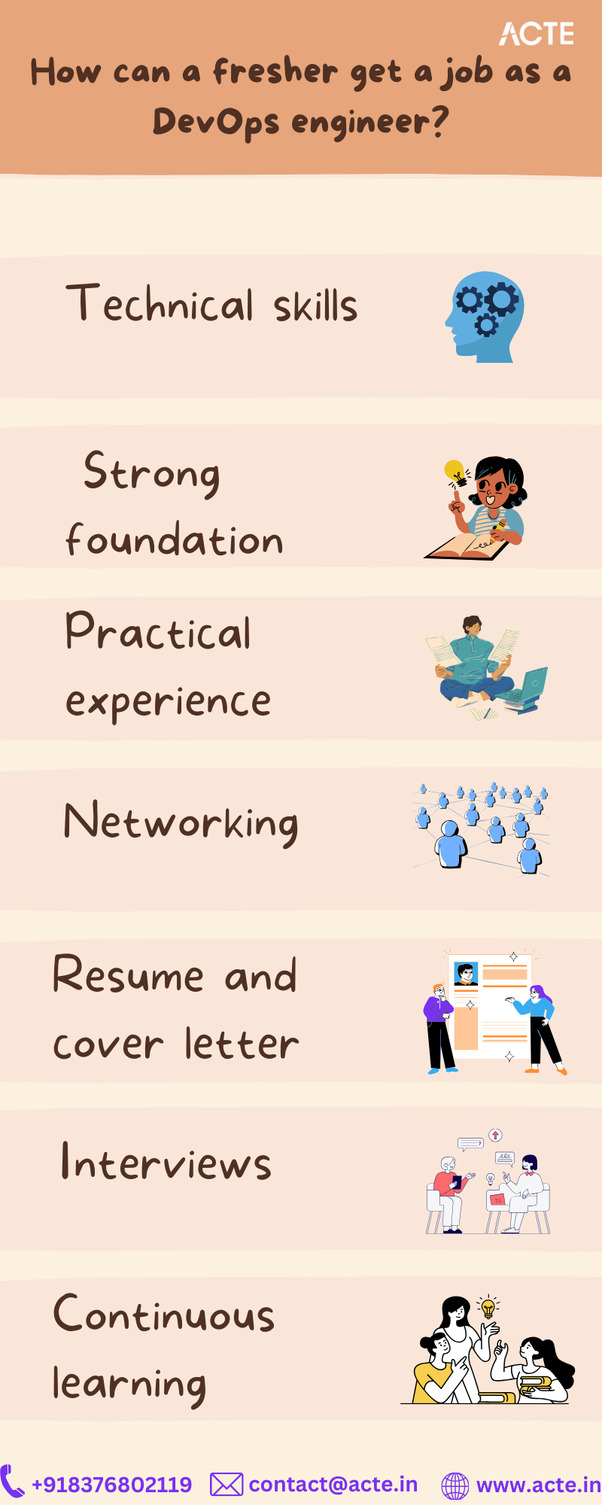
Securing a DevOps engineer position as a fresher requires a combination of technical skills, continuous learning, networking, and a strong online presence. By following the steps outlined above and staying dedicated to your professional development, you'll be well on your way to unlocking the path to success in the dynamic world of DevOps. Good luck!
0 notes
Text
Mastering the Full Stack: Essential Interview Topics for Developers
Absolutely! I’m thrilled to explore the realm of full-stack development with you. My proficiency in this field has expanded significantly over time. Selenium has become widely recognized and extensively employed, cutting across various industries. Advance your career in Full-Stack Developer at a Top Institution in Chennai, like ACTE Technologies.
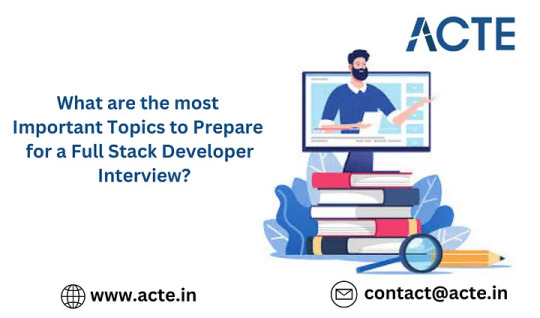
Preparing for a full-stack developer interview requires a thorough grasp of both front-end and back-end technologies.
Focus On The Following Key Topics:
1. HTML, CSS, and JavaScript:
Understand fundamental concepts and best practices for creating web pages and dynamic content.
2. Front-End Frameworks:
Explore React, Angular, or Vue.js, including component-based architecture and state management.
3. Responsive Design:
Implement techniques ensuring seamless application functionality across various devices and screen sizes.
4. Server-Side Languages:
Demonstrate proficiency in at least one language, such as JavaScript (Node.js), Python, Ruby, Java, or PHP.
5. Server Frameworks:
Utilize Express.js (Node.js), Django (Python), Ruby on Rails (Ruby), or others, with a focus on routing, middleware, and handling HTTP requests.
6. Database Management:
Showcase knowledge of both SQL and NoSQL databases, including CRUD operations and database design.
7. RESTful APIs:
Exhibit expertise in designing and consuming APIs for effective front-end to back-end communication.
8. Version Control:
Display proficiency in Git, encompassing understanding of branching, merging, and conflict resolution.
9. DevOps and Deployment:
Illustrate familiarity with deployment processes, tools, and cloud services like AWS, Azure, or Google Cloud.
10. Security Best Practices:
Demonstrate understanding of data protection, encryption, and user authentication.
11. Testing:
Showcase expertise in testing methodologies and frameworks (e.g., Jest) for ensuring code reliability.
12. Command Line/CLI:
Exhibit proficiency in using the command line for various tasks.
13. Agile/Scrum Methodologies:
Showcase understanding of Agile development practices for effective teamwork.
14. Soft Skills:
Emphasize communication, problem-solving, and teamwork skills.
15. Algorithm and Data Structures:
Brush up on fundamental algorithms and data structures.
16. System Design:
Demonstrate a high-level understanding of designing scalable and efficient systems.

Remember to tailor your preparation based on the specific job description and requirements of the position. Additionally, be ready to highlight relevant past projects and experiences in the full-stack development domain during the interview.
If you’re keen on exploring Full-stack Developer course in Chennai, I highly recommend considering Top Institutions like ACTE Technologies. They provide certification programs and job placement opportunities, guided by experienced instructors to enhance your learning journey. These resources are available both online and in-person. Enrolling in a course step by step could prove to be a valuable decision if it aligns with your interests.
I trust this addresses your query adequately. If you have more questions or need further clarification, please feel free to ask in the comments section.
If you’ve found this information valuable, I invite you to follow me on this platform and give it an upvote to encourage more discussions and insights about Full-stack Development. Your time and engagement are greatly appreciated, and I wish you a wonderful day ahead.
0 notes
Text
Question 21: How can I integrate Azure Data Factory with Azure DevOps for CI/CD?
Interview Questions on Azure Data Factory Development: #interview, #interviewquestions, #Microsoft, #azure, #adf , #eswarstechworld, #azuredataengineer, #development, #azuredatafactory , #azuredeveloper
Integrating Azure Data Factory with Azure DevOps for CI/CD (Continuous Integration and Continuous Deployment) enables automated and streamlined processes for deploying and managing data integration workflows. Integrating Azure Data Factory with Azure DevOps involves leveraging DevOps practices and tools to automate the build, deployment, and management of data integration workflows in Azure Data…

View On WordPress
#adf#azure#azuredataengineer#azuredatafactory#azuredeveloper#development#eswarstechworld#interview#interviewquestions#Microsoft
0 notes
Photo
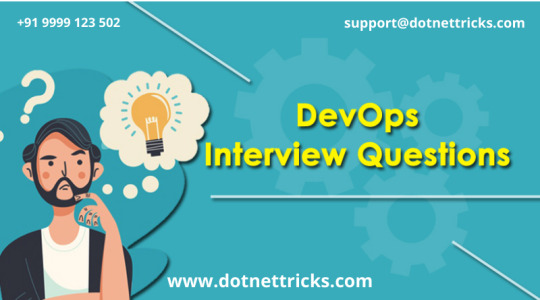
Today an increasing number of companies are seeing the reference to DevOps on the resumes of the candidates who are applying for the position of DevOps. Organizations are looking for Jenkins, Github and DevOps experience programming experts for planning to leverage over other employment aspirants and candidates are finding this as a challenging one. So, if you are hoping to land on that DevOps position and need some assistance to prepare, then the DevOps interview question answer Pdf file prepared by experienced programming professionals would be the right choice for you to crack the interview.
https://www.dotnettricks.com/learn/devops/top-20-azure-devops-interview-questions-answers
0 notes
Text
#azure#azuretraining#azure applications#microsoft azure#azure interview questions#azure devops#azure course#azure online training
0 notes
Video
youtube
ChatGPT + Azure DevOps Interview Questions and Answers
#youtube#ChatGPT + Azure DevOps Interview Questions and Answers chatgpt ai devops interview admin openai windows microsoft youtube azure
0 notes
Text

Powerpoint slide of the dev-side technology stack used at the company where I may be working soon. There is reportedly a different test-side technology stack that wasn't included in the interview presentation because the presentation was being given by a dev representative.
I was left with a lot of questions, like "Why are you showing me this?" and "How can this be relevant to me?" and "I have severe doubts about the ability of anyone to meaningfully use this big ball of mud and glue, unless 90% of it is shoved so far under the rug that they don't have to think about it any more than they think about assembler. Is that the case?" and "Why do you have Azure Devops twice?"
16 notes
·
View notes
Photo

Eklavya Online, EklavyaOnline, Self Study, Study Tutorial, Technical Interview Questions, Interview Questions Preparation, FAQ, Interview Questions, Most Asked Interview Questions, Rapid Fire, Latest Interview Questions, Updated Interview Questions Answers, Advance Java, Android Interview Questions, Angular 7 Interview Questions, Angular 8 Interview Questions, Angular Interview Questions, AngularJS Interview Questions, API Testing Interview Questions, Artificial Intelligence Interview Questions, ASP.NET Interview Questions, AWS Interview Questions, Backbone.js Interview Questions, Bitcoin Interview Questions, Blockchain Interview Questions, Blog, C Interview Questions, CodeIgniter Interview Questions, Core Java, Data Analytics Interview Questions, Data Structure Interview Questions, DB2 Interview Questions, DBMS Interview Questions, DevOps Interview Questions, Digital Marketing Interview Questions, Django Interview Questions, Dot Net Interview Questions, Drupal Interview Questions, Ember.js Interview Questions, Flutter Interview Questions, Hadoop Interview Questions, HR Interview Questions, Interview Tips, Joomla Interview Questions, Laravel Interview Questions, Machine Learning Interview Questions, Magento Interview Questions, Microsoft Azure Interview Question, MongoDB Interview Questions, MySQL Interview Questions, Node.js Interview Questions, Oracle Interview Questions, Phalcon Interview Question, PHP Interview Questions, PL/SQL Interview Questions, Power BI Interview Questions, Project Management Interview Questions, Pure.CSS Interview Questions, Python Interview Questions, Quality Assurance Interview Questions, R Interview Questions, React Native Interview Questions, Selenium Interview Questions, SEO Interview Questions, Software Testing Interview Questions, SQL Interview Questions, Swift Interview Questions, Tableau Interview Questions, Vue.js Interview Questions, Web Development Interview Questions, Web Services Interview Questions, WordPress Interview Questions
1 note
·
View note